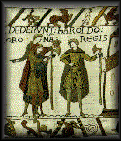2004
An appreciative reply that measures the incline of Henry Jenkins' middle ground.
The tenuous dynamics of Phoebe Senger's split story lead Lucy Suchman to ponder "methods and madness" in the metaphors we live by.
Even orienteering is of greater use to game designers than narratology, claims Marrku Eskelinen, heading towards an area free from stories once more.
As alternatives to agency-obsession, "critical technical practices" that connect art and technology are front and center in the work of Michael Mateas.
Whether CTPs should walk on three legs or two; how the robotic artwork Petit Mal is "interpretationally plastic;" what cultural assumptions we build into machines: just some of the response-topics here.
Eric Zimmerman modifies Gonzalo Frasca's game strategy with a strategic patch.
Eugene Thacker sees ethical acting as a potential stumbling block, one that trips up technological complicity.
"Critical videogames": moving beyond the non sequiter of now, Gonzalo Frasca projects a future in which the phrase would make sense.
Mizuko Ito recounts her experience at an unusual gaming convention in Japan, and posits fan culture as a way to understand software.
The "cognitive entailments" of a reader, or "interactor," are where Katherine Hayles redirects the new aesthetics of electronic textuality.
Simon Penny recalls that the origins of the human-computer interface, politicized by a military heritage, are now explored by artist-enigineers who chaperone fragmentation and dissent.
Tim Keane reviews Genet's republished Prisoner of Love, a 'mirror-memoir' in which Genet sees Palestine from the inside in an attempt to see himself from the outside.
2003
Reiichi Miura considers the worldwide reception of Japanese writer Haruki Murakami and charts a course for a fiction where nationalism loses relevance.
Richard Schechner remembers the real-life side of interaction.
Juggling economies and unknotting threads, Victor Vitanza pulls back to drop the curtain, theoretically, on The Politics of Information.
Marc LaFountain reviews a new collection of Bataille's writings and considers the philosopher's thoughts on prayer in a system and practice of atheology.
The Politics of Information: fifth and final installment under the Technocapitalist thread.
Chris Carter and Greg Ulmer dialogue through e-mails on the mission of the FRE.
Katie King on the challenges and rewards, in her own life and the lives of her students, that emerge when writing about personal encounters with technology.
Whether they fret over Ziggy Stardust or the condition of posthumanity, fans and scholars share, argues Harvey Molloy, a few habits of mind.


